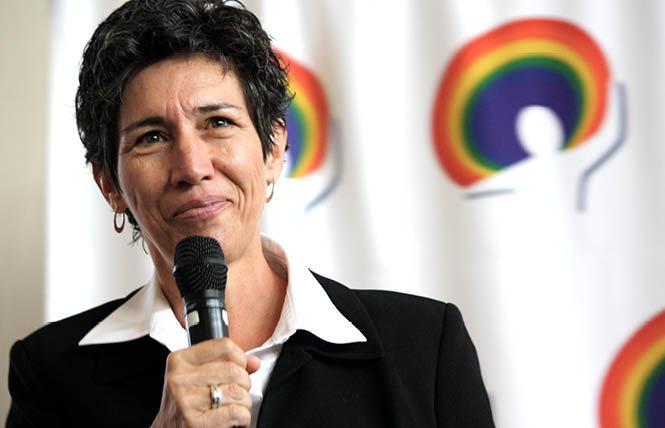State Senator Scott Wiener (D-San Francisco) and Assemblywoman Susan Eggman (D-Stockton) introduced recent legislation “to end blatant discrimination against LGBT young people regarding California’s sex offender registry.”
Under their bill, SB 145, the offenders would not have to automatically register as sex offenders if the offenders are within 10 years of age of the minor.
Wiener claims the current law “disproportionately targets LGBT young people for mandatory sex offender registration, since LGBT people usually cannot engage in vaginal intercourse.”
Existing law, the Sex Offender Registration Act, amended by Proposition 35 by voters in 2012 (Ban on Human Trafficking and Sex Slavery), requires a person convicted of a certain sex crime to register with law enforcement as a sex offender while residing in California or while attending school or working in California.
Wiener says,
“Currently, for consensual yet illegal sexual relations between a teenager age 15 and over and a partner within 10 years of age, ‘sexual intercourse’ (i.e., normal intercourse) does not require the offender to go onto the sex offender registry; rather, the judge decides based on the facts of the case whether sex offender registration is warranted or unwarranted. By contrast, for other forms of intercourse — specifically, oral and sodomy intercourse — sex offender registration is mandated under all situations, with no judicial discretion.”
“This bill would authorize a person convicted of certain offenses involving minors to seek discretionary relief from the duty to register if the person is not more than 10 years older than the minor,” SB 145 states.
Proposition 35 was created and passed to protect children from sexual exploitation and sex trafficking. Victims of sex trafficking are often vulnerable children, “afraid for their lives and abused—sexually, physically, and mentally,” the Proposition said.
Legislators Wiener and Eggman say they are trying to shield LGBT young people from having to automatically register as sex offenders for specified sex crimes. But their bill does much more.
SB 145 would allow a sex offender who lures a minor with the intent to commit a felony (i.e. a sex act) the ability to escape registering as a sex offender as long as the offender is within 10 years of age of the minor. No specification is made as to whether the sexual offender is straight or LGBT.
SB 145 would add a section to the state’s penal code (Section 290.55) stipulating that as long as the offender is “not more than 10 years older than the minor,” they are not automatically mandated to register as a sex offender. There is no age limit or range specified, except for existing law which already excludes lewd acts with children under 14.
SB 145 appears to allow adults to victimize minors by luring them with the intent to have sex, and then shields the predator from being automatically registered as a sex offender, as in the case of a 25 year old luring a 15 year old for sex, or a 22 year old luring a 12 year old.
SB 145, as currently written, appears to allow certain sexual predators to live among the population without anyone being aware.
Why is this bill needed?
Here is the text from SB 145:
“This bill would authorize a person convicted of certain offenses involving minors to seek discretionary relief from the duty to register if the person is not more than 10 years older than the minor.
Digest Key – Vote: MAJORITY Appropriation: NO Fiscal Committee: YES Local Program: NO
THE PEOPLE OF THE STATE OF CALIFORNIA DO ENACT AS FOLLOWS:
SECTION 1. Section 290.55 is added to the Penal Code, immediately following Section 290.5, to read:
290.55. (a) A person convicted of an offense specified in subdivision (b) may, by writ of mandate, seek discretionary relief from the duty, imposed as a result of that conviction, to register pursuant to the act if, at the time of the offense, the person is not more than 10 years older than the minor, as measured from the minor’s date of birth to the person’s date of birth.
Here is the current California Penal Code § 288.3 (2017)
(a) Every person who contacts or communicates with a minor, or attempts to contact or communicate with a minor, who knows or reasonably should know that the person is a minor, with intent to commit an offense specified in Section 207, 209, 261, 264.1, 273a, 286, 287, 288, 288.2, 289, 311.1, 311.2, 311.4 or 311.11, or former Section 288a, involving the minor shall be punished by imprisonment in the state prison for the term prescribed for an attempt to commit the intended offense.
(b) As used in this section, “contacts or communicates with” shall include direct and indirect contact or communication that may be achieved personally or by use of an agent or agency, any print medium, any postal service, a common carrier or communication common carrier, any electronic communications system, or any telecommunications, wire, computer, or radio communications device or system.
(c) A person convicted of a violation of subdivision (a) who has previously been convicted of a violation of subdivision (a) shall be punished by an additional and consecutive term of imprisonment in the state prison for five years.
In February, California Globe reported on another sex crime bill introduced by California Democrats: “legislation to shield a person from the consequences of crimes they commit in California, even violent ones, as long as the person reports the crimes to authorities. The language of the proposed statute appears to immunize a person from ANY crime so long as they are reporting a violation of a sex crime law.” Sen. Scott Wiener (D) is the author of California Senate Bill 233.
As each new moral abomination in our culture seeks—and receives—acceptance by a sin-loving world, we are reminded of a thousand lethargic declarations from Christians and non-Christians alike. “Oh THAT will never happen.”
It is.
****
“He that justifieth the wicked, and he that condemneth the just, even they both are abomination to the LORD” (Proverbs 17:15).



